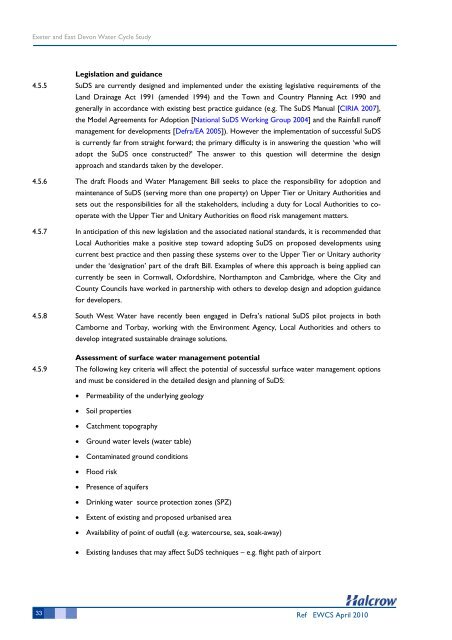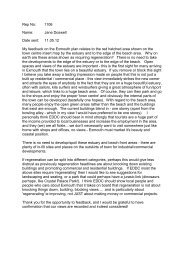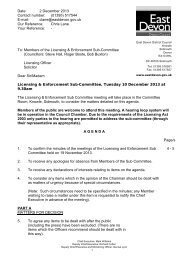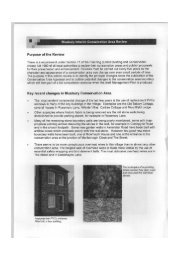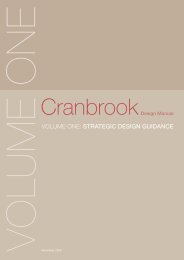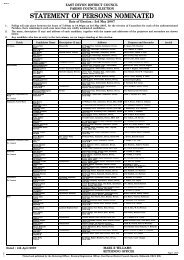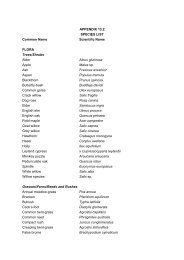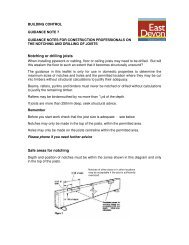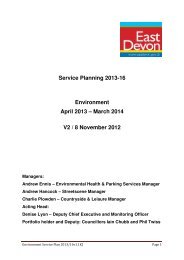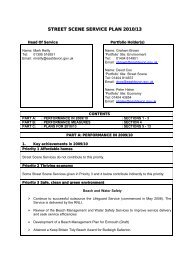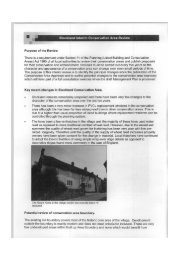Water Cycle Study - East Devon District Council
Water Cycle Study - East Devon District Council
Water Cycle Study - East Devon District Council
You also want an ePaper? Increase the reach of your titles
YUMPU automatically turns print PDFs into web optimized ePapers that Google loves.
Exeter and <strong>East</strong> <strong>Devon</strong> <strong>Water</strong> <strong>Cycle</strong> <strong>Study</strong><br />
Legislation and guidance<br />
4.5.5 SuDS are currently designed and implemented under the existing legislative requirements of the<br />
Land Drainage Act 1991 (amended 1994) and the Town and Country Planning Act 1990 and<br />
generally in accordance with existing best practice guidance (e.g. The SuDS Manual [CIRIA 2007],<br />
the Model Agreements for Adoption [National SuDS Working Group 2004] and the Rainfall runoff<br />
management for developments [Defra/EA 2005]). However the implementation of successful SuDS<br />
is currently far from straight forward; the primary difficulty is in answering the question ‘who will<br />
adopt the SuDS once constructed?’ The answer to this question will determine the design<br />
approach and standards taken by the developer.<br />
4.5.6 The draft Floods and <strong>Water</strong> Management Bill seeks to place the responsibility for adoption and<br />
maintenance of SuDS (serving more than one property) on Upper Tier or Unitary Authorities and<br />
sets out the responsibilities for all the stakeholders, including a duty for Local Authorities to cooperate<br />
with the Upper Tier and Unitary Authorities on flood risk management matters.<br />
4.5.7 In anticipation of this new legislation and the associated national standards, it is recommended that<br />
Local Authorities make a positive step toward adopting SuDS on proposed developments using<br />
current best practice and then passing these systems over to the Upper Tier or Unitary authority<br />
under the ‘designation’ part of the draft Bill. Examples of where this approach is being applied can<br />
currently be seen in Cornwall, Oxfordshire, Northampton and Cambridge, where the City and<br />
County <strong>Council</strong>s have worked in partnership with others to develop design and adoption guidance<br />
for developers.<br />
4.5.8 South West <strong>Water</strong> have recently been engaged in Defra’s national SuDS pilot projects in both<br />
Camborne and Torbay, working with the Environment Agency, Local Authorities and others to<br />
develop integrated sustainable drainage solutions.<br />
Assessment of surface water management potential<br />
4.5.9 The following key criteria will affect the potential of successful surface water management options<br />
and must be considered in the detailed design and planning of SuDS:<br />
• Permeability of the underlying geology<br />
• Soil properties<br />
• Catchment topography<br />
• Ground water levels (water table)<br />
• Contaminated ground conditions<br />
• Flood risk<br />
• Presence of aquifers<br />
• Drinking water source protection zones (SPZ)<br />
• Extent of existing and proposed urbanised area<br />
• Availability of point of outfall (e.g. watercourse, sea, soak-away)<br />
• Existing landuses that may affect SuDS techniques – e.g. flight path of airport<br />
33 Ref EWCS April 2010


